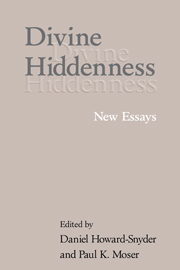Book contents
- Frontmatter
- Contents
- List of Contributors
- Introduction: The Hiddenness of God
- 1 What Is the Problem of the Hiddenness of God?
- 2 What the Hiddenness of God Reveals: A Collaborative Discussion
- 3 Deus Absconditus
- 4 St. John of the Cross and the Necessity of Divine Hiddenness
- 5 Jonathan Edwards and the Hiddenness of God
- 6 Cognitive Idolatry and Divine Hiding
- 7 Divine Hiddenness: What Is the Problem?
- 8 A Kierkegaardian View of Divine Hiddenness
- 9 The Hiddenness of God: A Puzzle or a Real Problem?
- 10 Seeking But Not Believing: Confessions of a Practicing Agnostic
- 11 The Silence of the God Who Speaks
- Bibliography
- Index of Names
- Index of Subjects
8 - A Kierkegaardian View of Divine Hiddenness
Published online by Cambridge University Press: 10 November 2009
- Frontmatter
- Contents
- List of Contributors
- Introduction: The Hiddenness of God
- 1 What Is the Problem of the Hiddenness of God?
- 2 What the Hiddenness of God Reveals: A Collaborative Discussion
- 3 Deus Absconditus
- 4 St. John of the Cross and the Necessity of Divine Hiddenness
- 5 Jonathan Edwards and the Hiddenness of God
- 6 Cognitive Idolatry and Divine Hiding
- 7 Divine Hiddenness: What Is the Problem?
- 8 A Kierkegaardian View of Divine Hiddenness
- 9 The Hiddenness of God: A Puzzle or a Real Problem?
- 10 Seeking But Not Believing: Confessions of a Practicing Agnostic
- 11 The Silence of the God Who Speaks
- Bibliography
- Index of Names
- Index of Subjects
Summary
All this heaven-storming you want to do. If God wanted His tracks discovered, wouldn't He have made them plainer? Why tuck them into odd bits of astronomy and nuclear physics? Why be so coy, if You're the Deity?
Roger's Version, John UpdikeIn one of his Hasidic portraits, Elie Wiesel tells the story of a rebbe whose student complained to him about God's hiddenness. The rebbe replied, “True, God may be hiding, but you know it. That ought to be sufficient.” For some people the idea of God's hiddenness is not a problem as long as we ‘know’ or at least reasonably believe that ‘God’ is hidden/hiding. In Divine Hiddenness and Human Reason, J. L. Schellenberg examines the implications of divine hiddenness for theism, and distinguishes three possible versions: the “obscuring of God's existence,” (2) the “incomprehensibility of God's nature,” and (3) “our inability to detect the exact pattern of God's activity in the world.” “All I seek to show,” he insists, “is that we might expect God's existence to be more obvious. I am happy to allow that the same claim made in respect of the depths of God's nature or the exact pattern of his activity would have much less to recommend it.“ Schellenberg's contribution to this volume also maintains this emphasis on “existence.”
- Type
- Chapter
- Information
- Divine HiddennessNew Essays, pp. 164 - 180Publisher: Cambridge University PressPrint publication year: 2001



